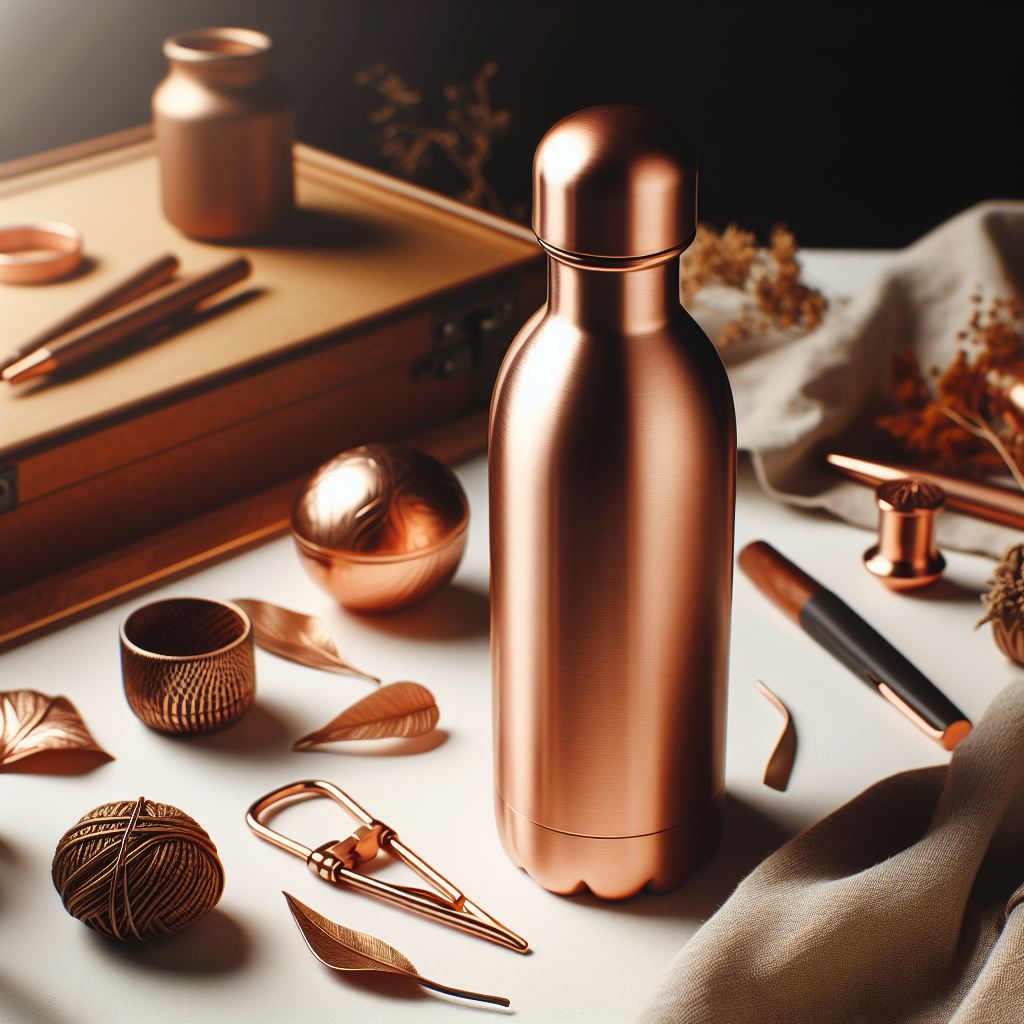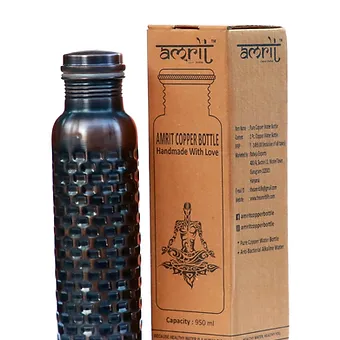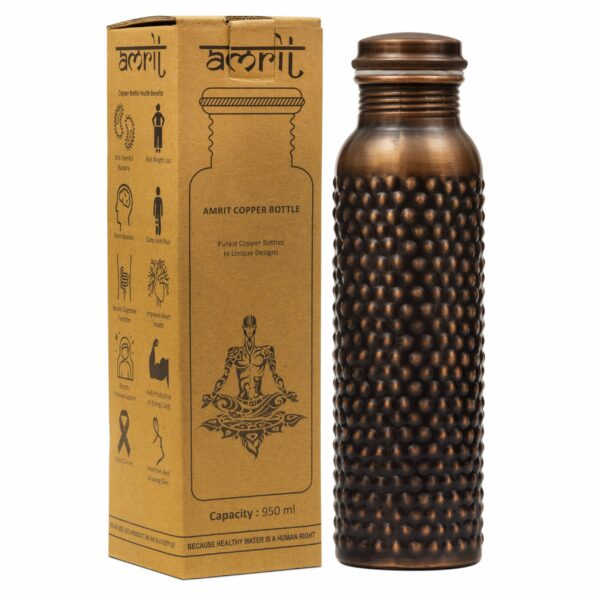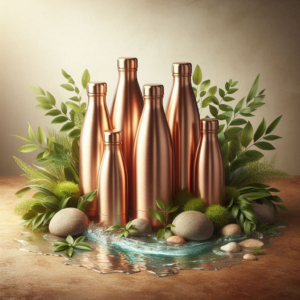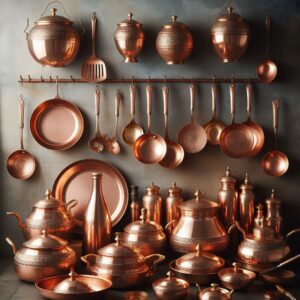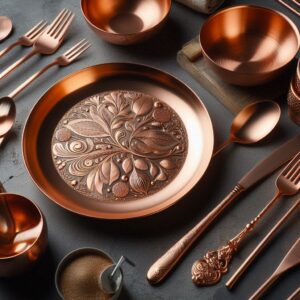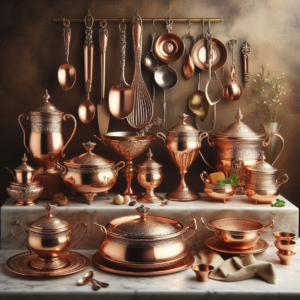Have you ever wondered why some people swear by drinking water from copper bottles? If you Already Use Copper Bottles, you must have wondered, Do Copper Water Bottles Rust?
Well, there are many reasons why copper water bottles are good for your health. For instance, copper is known to have antibacterial, anti-inflammatory, and antioxidant properties that can boost your immunity, digestion, and skin health. Sounds amazing, right?
But you might have also heard some rumors that copper water bottles can rust over time and affect the quality of water. Is that true? Should you be worried about drinking water from a rusty bottle? Don’t worry, we are here to clear up any confusion and answer all your questions. In this blog post, we will explain whether copper water bottles rust or not, and how to properly care for them.
What is rust and how does it form?
Rust is a reddish-brown substance that forms on iron and steel objects when they are exposed to oxygen and water. It is a type of corrosion, which means the deterioration of a metal due to a chemical reaction with its environment. Rust can weaken the metal and make it brittle, flaky, and unsightly.
You might have seen rust on old cars, bikes, tools, or pipes. Rust can also form on some metal water bottles, especially if they are made of low-quality materials or have scratches or cracks on their surface. Rusty water bottles can not only look bad, but also pose a health risk, as rust can contaminate the water and cause infections or diseases.
By the way have you thought? How do you ensure a Perfect Quality Copper Bottle?
-
Amrit Antique Brick Copper Bottle| 950ml, 300 gms| No Outer Cleaning Required
Original price was: ₹1,499.00.₹1,199.20Current price is: ₹1,199.20. -
Amrit Antique Copper Bottle and Glasses | No Outer Cleaning Required
Original price was: ₹2,199.00.₹1,759.20Current price is: ₹1,759.20. -
Amrit Antique Pine Copper Bottle| 950ml, 300 gms
Original price was: ₹1,499.00.₹1,049.00Current price is: ₹1,049.00.
Do copper water bottles rust?
The good news is that copper water bottles do not rust. Why? Because copper is a non-ferrous metal, which means it does not contain iron. Rust only affects iron and steel, so copper is immune to it. Copper water bottles can last for a long time without rusting, as long as they are made of pure copper and not mixed with other metals.
However, copper water bottles can undergo another type of oxidation, which is the process of losing electrons when exposed to oxygen. Oxidation can cause a thin layer of greenish or brownish color to form on the surface of copper. This layer is called patina.
What is patina and is it harmful?
Patina is not rust, but a natural phenomenon that occurs on copper over time. It is a protective layer that prevents further oxidation and corrosion of copper. Patina can vary in color, depending on the environment and the type of copper. Some people find patina beautiful and artistic, as it gives copper a vintage and antique look.
Patina is not harmful and does not affect the effectiveness of copper bottles. In fact, some studies suggest that patina can enhance the antibacterial properties of copper, as it creates a more acidic environment that inhibits the growth of bacteria. Patina can also add some trace minerals to the water, such as copper, zinc, and iron, which can benefit your health.
How to prevent or remove patina from copper water bottles?
If you prefer your copper water bottles to look shiny and new, you might want to prevent or remove patina from them. The best way to do that is to clean your copper water bottles regularly with natural ingredients, such as lemon juice, vinegar, or baking soda. Here are some easy steps to follow:
- Rinse your copper water bottle with water and empty it
- Cut a lemon in half and squeeze some juice into the bottle
- Add a teaspoon of salt and shake the bottle well
- Alternatively, you can use vinegar or baking soda instead of lemon juice and salt
- Let the bottle sit for a few minutes and then rinse it with water
- Dry the bottle with a soft cloth and store it in a cool and dry place
You can repeat this process once a week or whenever you notice patina forming on your copper water bottle. Avoid using harsh chemicals or abrasive materials to clean your copper water bottle, as they can damage the metal and reduce its quality.

How much copper water should you drink?
Drinking water from copper water bottles offers many benefits, but moderation is key. Copper is essential for your body, but excess intake can be toxic. Too much copper can cause nausea, vomiting, stomach ache, headache, dizziness, or liver damage.
Adults should consume about 0.9 milligrams of copper daily. Copper water bottles can provide some of this amount, but you should also get copper from nuts, seeds, beans, whole grains, seafood, and dark chocolate. The copper content in water varies based on water quality, copper type, and storage duration.
Limit your intake to two or three glasses of copper water per day. Avoid storing water in copper bottles for more than eight hours. Consult your doctor before using copper water bottles, especially if you have medical conditions or allergies.
Conclusion
We hope this blog post has helped you understand whether copper water bottles rust or not, and how to properly care for them. Copper water bottles are a great way to enjoy the health benefits of copper, but you should also be aware of the potential risks and precautions. Copper water bottles do not rust, but they can develop patina, which is harmless and can be easily cleaned. Drinking water from copper water bottles can boost your immunity, digestion, and skin health, but you should also drink in moderation and seek medical advice if needed.
If you are interested in buying high-quality copper water bottles, we have some great options for you. Check out our website and browse our collection of pure copper water bottles, available in different sizes, shapes, and designs. Our copper water bottles are made of 100% copper and have a leak-proof lid and a smooth finish. They are also easy to clean and maintain, and come with a lifetime warranty. Order yours today and enjoy the benefits of copper water!
Do you have any questions or comments about copper water bottles? Have you tried drinking water from copper water bottles? What was your experience? Share your thoughts with us in the comment section below. We would love to hear from you!

